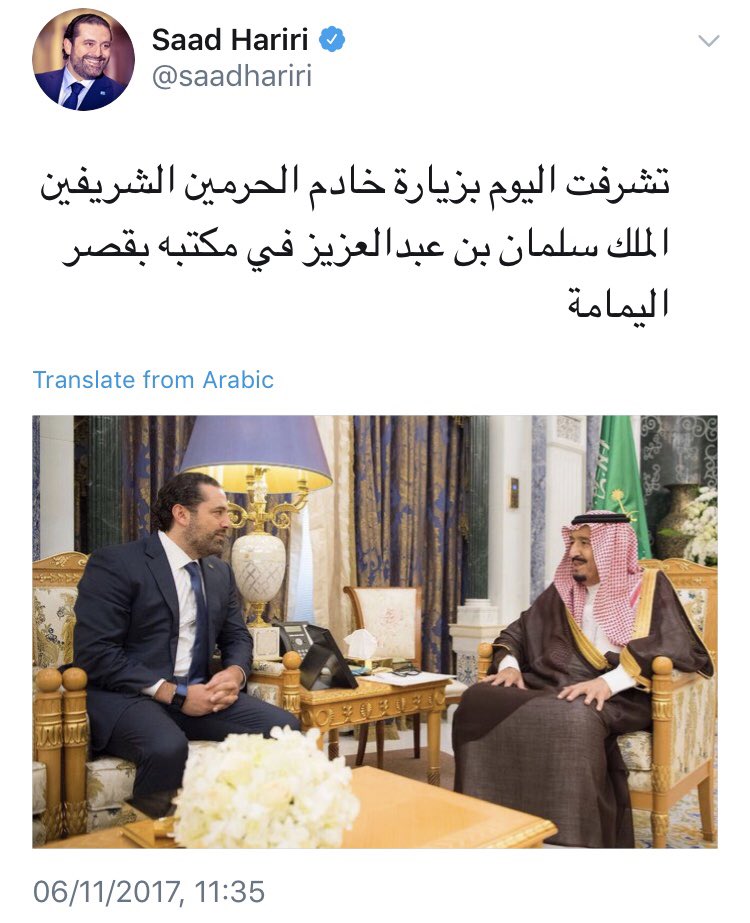These articles represent opinions of only the author
by saudigazette.com.sa BEIRUT — Lebanon’s president stressed that stability is “a red line” after Prime Minister Saad Hariri’s shock resignation, Justice Minister Salim Jreissati said on Monday after meeting the president. In a televised speech, Saad Hariri had said he feared an assassination plot against him and blamed Iran along with its Lebanese ally Hezbollah for sowing strife in the Arab world. His resignation stunned Beirut’s political establishment, brought down the coalition government and sparked a new political crisis. Lebanese President Michel Aoun convened a meeting with ministers and top security officials at the Baabda palace on Monday to assess the security situation. Aoun told them political leaders had been responsive to calls for calm, strengthening security and national unity, his office said. The president will take no steps regarding the prime minister’s resignation before Hariri returns from abroad, the justice minister said at a press conference after the meeting. Aoun said security, economic, financial, and political stability is “a red line”, Jreissati said. “The president is waiting for Hariri’s return to hear from him personally. This indicates a sovereign vision…and that the resignation must be voluntary in every sense.” On Sunday, Bahrain ordered its citizens in Lebanon to “leave immediately.” Bahrain’s Foreign Ministry said citizens were banned from traveling to Lebanon, as well. Hariri became prime minister in late 2016 in a coalition government that included the Shiite militant group Hezbollah. — Agenci
by Ahmed Feteha – bloomberg.com Lebanese bonds dropped on Monday after Prime Minister Saad al-Hariri unexpectedly resigned in a speech from Saudi Arabia, raising concerns that a renewed confrontation between the kingdom and regional rival Iran could destabilize the country. The yield on Lebanon’s $750 million Eurobonds due 2037 jumped 63 basis points, the most since they were issued in March, according to data compiled by Bloomberg. Shares in Solidere, the property developer founded by Hariri’s late father, plunged 7.6 percent. Hariri announced his resignation from Saudi Arabia on Saturday, blaming Iran and Hezbollah, the militant group backed by the Islamic Republic, for creating a state within a state. Investors could be worried that his decision may be linked to regional and international efforts to curb Iranian influence Lebanon, according to Raza Agha, the London-based chief economist for the Middle East and Africa at VTB Capital Plc. The long-term outlook in Lebanon is less in question, but “Hariri’s resignation, and the blame placed on Iran and Iranian proxies, will up domestic political tensions,” he said.

Hariri, a pro-Saudi politician, stepped down at a time when the Islamic Republic and its allies are widely seen to have won the proxy war against Sunni powers in neighboring Syria. Saudi Arabia and Iran are also on opposite ends of other regional conflicts including in Yemen and Ira Lebanon’s central bank Governor Riad Salameh said on Monday that the crisis was political and not monetary, with no impact on the currency. The resignation comes as Lebanon struggles with a ballooning budget deficit that the International Monetary Fund expects to reach about 10 percent of economic output. The Lebanese economy is also suffering from the impact of the war in neighboring Syria, which cut major trade routes and brought more than 1 million refugees into the country.
‘Free Saad Hariri’: Lebanese Convinced Saudis Are Holding Former PM, as Conspiracy Theories Circulate
by Al Bawaba – One of the most persistent is that former Lebanese Prime Minister Saad Hariri is being held hostage in Saudi Arabia. That was the story according to al-Akhbar, which has been described by the New York Times as “wholeheartedly supporting Hezbollah.” On Sunday the daily published a full-page image of Hariri on its front cover accompanied by the headline “hostage.”
Al-Akhbar also published a story claiming that Egypt’s President Sisi had speculated Hariri was under house arrest. Hariri had resigned from Riyadh on Saturday, accusing Iran and its Lebanese ally Hezbollah of destabilizing the Arab world. He also cited a threat to his life, saying that the atmosphere was reminiscent of prior to the assassination of his father Rafic in 2005. The former PM, who was born in Saudi Arabia, has not yet returned to Lebanon. On Monday he met with the Saudi King Salman, which was hailed by Lebanese Interior Minister Nohad Machnouk as proof that “rumors” of his detention were untrue.

There were even claims he was inside Riyadh’s Ritz Carlton, where rumors have suggested Saudi princes detained over alleged corruption on Saturday are being held.Posts using the tag seem largely to be tongue-in cheek, however. A new website “http://freesaadhariri.com” has even been launched, hoping to “free Lebanon’s Prime Minister Saad Hariri from the Saudi Arabia jails!” It has a counter showing how long he is supposed to have been held captive down to the second. Journalist with largely pro-Saudi al-Hayat, Joyce Karam, slammed reports of Hariri’s arrest in a series of tweets.
While there is no serious suggestion that he has been kidnapped, it is not just in the press and on social media that speculation about Saudi intervention in the Hariri’s resignation has been rife. On Sunday, Hezbollah leader Hassan Nasrallah said: “It is clear that the resignation was a Saudi decision that was imposed on Prime Minister Hariri.” “It was not his intention, not his wish, and not his decision.” Iran’s foreign ministry has also called it a “plot jointly designed by Saudi Arabia and Israel.” Lebanese Justice Minister Salim Jreissati indicated on Monday that President Michel Aoun would await Hariri’s return before accepting his resignation. “The resignation must be voluntary,” he said pointedly Hariri’s resignation effectively brought an end to the coalition government he had led since December 2016, which had included Hezbollah. His shock departure is likely to see in a period of increased instability in Lebanon, one of several sites where Iran and Saudi Arabia vie for influence in the region.




